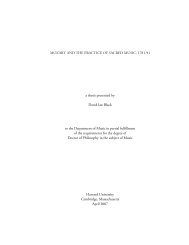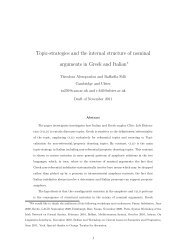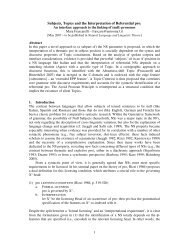You're like `why not?' The quotative expressions of Glasgow ...
You're like `why not?' The quotative expressions of Glasgow ...
You're like `why not?' The quotative expressions of Glasgow ...
Create successful ePaper yourself
Turn your PDF publications into a flip-book with our unique Google optimized e-Paper software.
QUOTATIVES IN GLASGOW 19<br />
2. A pilot study <strong>of</strong> English novels revealed a pattern <strong>of</strong> gender stereotyping in the use <strong>of</strong><br />
graphic verbs and evaluative adverbs.<br />
Used only <strong>of</strong> men Used only <strong>of</strong> women<br />
said ®rmly said quietly<br />
said bluntly asked innocently<br />
said coldly echoed obediently<br />
said smugly said loyally<br />
urged o€ered humbly<br />
burst forth whispered<br />
demanded aggressively asked mildly<br />
said challengingly agreed placidly<br />
cried furiously smiled complacently<br />
exclaimed contemptuously fumbled on<br />
cried portentously implored<br />
grumbled pleaded<br />
Macaulay 1994: 96)<br />
<strong>The</strong>se examples come from a paper by Nan Wonderly when she was an undergraduate<br />
at Pomona College.<br />
3. Judging from some <strong>of</strong> the examples in Holmes 1997), go has reached New Zealand.<br />
4. Although the project was <strong>not</strong> designed to collect information for discourse analysis,<br />
the data set is very rich and provides useful material for the quantitative analysis <strong>of</strong><br />
age, gender, and social class di€erences in the use <strong>of</strong> various discourse features<br />
Macaulay 1999). My stimulus for looking at <strong>quotative</strong>s came from reading<br />
Tagliamonte and Hudson 1999).<br />
5. A third <strong>of</strong> the zero <strong>quotative</strong>s occur in the telling <strong>of</strong> a joke by one <strong>of</strong> the working-class<br />
boys. <strong>The</strong> context makes the use <strong>of</strong> a <strong>quotative</strong> unnecessary, as can be seen in the<br />
following extract:<br />
the priest says to them `What is it you want?'<br />
he goes `Can we get a home for the night and some food possibly warm<br />
father?'<br />
he goes `Fair enough fair enough come on in'<br />
he goes `What religion are you?' to the ®rst boy<br />
ˆ) `I'm a catholic father'<br />
ˆ) `Come on in<br />
there's a mat<br />
warm yourself by the ®re'<br />
ˆ) walks up to the second boy `And what religion are you?'<br />
ˆ) `I'm a catholic father'<br />
ˆ) `Come on in<br />
there's a mat<br />
warm yourself by the ®re'<br />
ˆ) walks up to the third boy `And what religion are you son?'<br />
ˆ) `I'm a prodestant father'<br />
ˆ) `In the name <strong>of</strong> God I won't turn you away blanket in the corner'<br />
6. Miller and Weinert 1995) examine the discourse functions <strong>of</strong> <strong>like</strong>, which has a long<br />
history in Scotland, but they found no examples <strong>of</strong> <strong>quotative</strong> <strong>like</strong> in conversations<br />
recorded in 1977±1980. <strong>The</strong> focus function <strong>of</strong> <strong>like</strong> in the <strong>Glasgow</strong> conversations will<br />
be examined in a later paper.<br />
# Blackwell Publishers Ltd. 2001
















